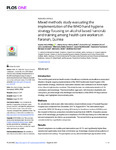2021-08-26Zeitschriftenartikel
Mixed methods study evaluating the implementation of the WHO hand hygiene strategy focusing on alcohol based handrub and training among health care workers in Faranah, Guinea
Müller, Sophie Alice
Diallo, Alpha Oumar Karim
Rocha, Carlos
Wood, Rebekah
Landsmann, Lena
Camara, Bienvenu Salim
Schlindwein, Laszlo
Tounkara, Ousmane
Arvand, Mardjan
Diallo, Mamadou
Borchert, Matthias
Introduction
The most frequent adverse health events in healthcare worldwide are healthcare-associated infection. Despite ongoing implementation of the WHO multimodal Hand Hygiene (HH) Improvement Strategy, healthcare-associated infection rate continues to be twofold higher in low- than in high-income countries. This study focused on continued evaluation of HH compliance and knowledge. The mixed method approach, with inclusion of patients and care-givers, provided insight into challenges and facilitators of the WHO HH Improvement Strategy, and highlighted improvement points.
Methods
An uncontrolled, before-and–after intervention, mixed methods study in Faranah Regional Hospital was conducted from December 2017 to August 2019. The intervention implemented the WHO HH Strategy including HH training for healthcare workers (HCWs), and the relaunch of the local production of alcohol-based handrub (ABHR). A baseline assessment of HH knowledge, perception and compliance of HCWs was done prior to the intervention and compared to two follow-up assessments. The second follow-up assessment was complemented by a qualitative component.
Results
Overall compliance six months post-intervention was 45.1% and significantly higher than baseline but significantly lower than in first follow-up. Knowledge showed similar patterns of improvement and waning. The perception survey demonstrated high appreciation of the intervention, such as local production of ABHR. HCW’s were concerned about overconsuming of ABHR, however simultaneous quantitative measurements showed that consumption in fact was 36% of the estimated amount needed for sufficient HH compliance. Potential fields for improvement identified by HCWs to enhance sustainability were permanent ABHR availability, having a dedicated person with ownership over continuous simulation HH trainings including simulations to improve technique.
Conclusion
The study shows that the WHO multimodal HH strategy has a positive effect on HCW compliance and knowledge. Improvement points identified by local staff like sensitization on appropriate ABHR amount per HH action should be considered for sustainable HH improvement.
Files in this item

